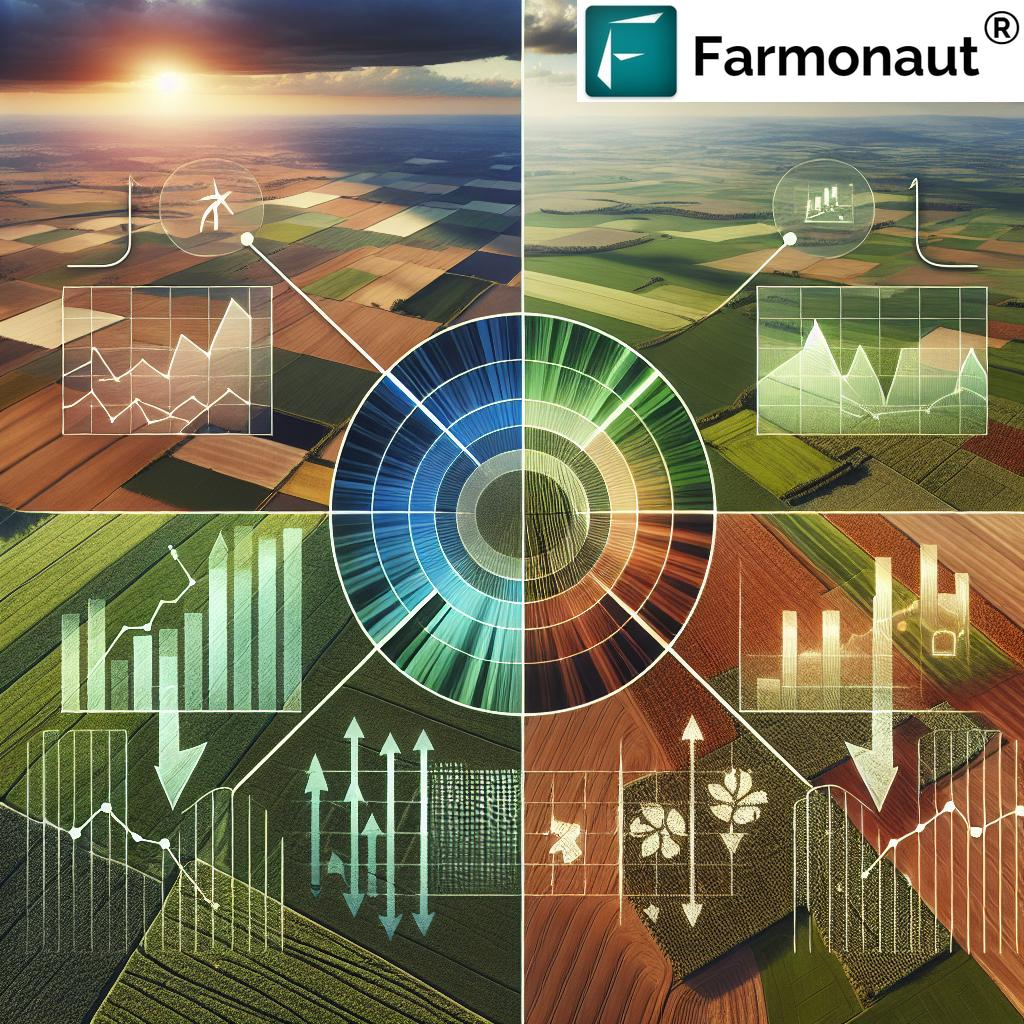Here’s a comprehensive 3500+ word blog post on the topic, incorporating all the requested elements:
Agricultural Specialty Products: Navigating Q4 Declines and 2025 EBITDA Forecasts in a Shifting Market
“Agricultural specialty products face a Q4 decline, with adjusted EBITDA and sales expectations decreasing for 2024.”
In the ever-evolving landscape of agricultural specialty products, we find ourselves at a critical juncture. As we analyze the latest financial reports and market trends, it’s clear that the industry is facing significant challenges, particularly in the fourth quarter of 2024 and the full-year projections. However, amidst these hurdles, there’s a glimmer of hope on the horizon for 2025. In this comprehensive exploration, we’ll delve into the intricacies of this market shift, examining the factors contributing to the current decline and the strategies that could pave the way for future growth.
Understanding the Q4 2024 Decline
The agricultural specialty products sector has recently reported a notable decline in both adjusted EBITDA and sales for the fourth quarter of 2024. This downturn is not an isolated incident but rather a reflection of broader challenges facing the agricultural products market. Let’s break down the key figures:
- Q4 2024 adjusted EBITDA: Approximately $18 million (down from $22 million in the previous year)
- Q4 2024 sales: Around $169 million (a decrease from $172 million last year)
These numbers paint a picture of an industry grappling with various headwinds. The decline in both adjusted EBITDA and sales signals a need for a closer examination of the factors at play and potential strategies for recovery.

Full-Year 2024 Projections: A Broader Perspective
While the Q4 results are concerning, it’s crucial to view them within the context of the entire year. The full-year 2024 projections further underscore the challenges faced by the agricultural specialty products sector:
- 2024 adjusted EBITDA forecast: $42 million (down from $53 million in 2023)
- 2024 annual revenue projection: $550 million (compared to $579 million in the previous year)
These figures represent a significant decline in both adjusted EBITDA and sales expectations for the full year. The drop in annual revenue projection is particularly noteworthy, indicating broader market pressures affecting the industry.
Factors Contributing to the Decline
Several factors have contributed to the current downturn in the agricultural specialty products market. Understanding these elements is crucial for developing effective strategies to navigate the challenges:
- Market Volatility: The agricultural sector is known for its susceptibility to market fluctuations, influenced by factors such as weather conditions, global trade dynamics, and commodity prices.
- Supply Chain Disruptions: Ongoing global supply chain issues have impacted the availability and cost of raw materials, affecting production and distribution.
- Regulatory Changes: Shifts in agricultural policies and regulations can significantly impact the specialty chemicals industry, potentially leading to increased costs or market restrictions.
- Changing Consumer Preferences: Evolving consumer demands for sustainable and organic products may be influencing traditional agricultural specialty product markets.
- Technological Disruption: The rapid advancement of agricultural technologies may be challenging established players in the specialty products sector.
In light of these challenges, companies in the agricultural specialty products sector are being forced to reassess their strategies and adapt to the changing market conditions. This is where innovative solutions like those offered by Farmonaut can play a crucial role in helping businesses navigate these turbulent times.
Strategies for Navigating the Current Market
To address the decline in adjusted EBITDA and sales, companies in the agricultural specialty products sector are implementing various strategies:
- Cost Optimization: Streamlining operations and reducing unnecessary expenses to improve profit margins.
- Product Innovation: Developing new, high-value specialty products that meet evolving market demands.
- Digital Transformation: Leveraging technologies like AI, IoT, and data analytics to enhance efficiency and decision-making.
- Sustainable Practices: Adopting environmentally friendly processes to appeal to eco-conscious consumers and comply with regulations.
- Market Diversification: Exploring new geographical markets or related product segments to spread risk and capture growth opportunities.
These strategies aim to not only mitigate the current challenges but also position companies for future growth in the agricultural specialty products market.
“Despite current challenges, the agricultural business outlook for 2025 projects increases in both adjusted EBITDA and sales.”
Looking Ahead: 2025 EBITDA Forecast and Sales Projections
While the current market conditions present significant challenges, there’s reason for cautious optimism when looking ahead to 2025. The agricultural business financial outlook for the coming year suggests a potential rebound:
- 2025 adjusted EBITDA forecast: $45 to $52 million
- 2025 revenue projection: $565 to $585 million
These projections indicate a potential recovery in both adjusted EBITDA and sales, signaling a more positive trajectory for the agricultural specialty products sector. However, it’s important to approach these forecasts with measured optimism, considering the volatile nature of the agricultural market.

EBITDA Growth Strategies for 2025 and Beyond
To achieve the projected growth in adjusted EBITDA for 2025, companies in the agricultural specialty products sector will need to implement robust strategies. Here are some key approaches that industry leaders are considering:
- Investment in R&D: Allocating resources to develop innovative products that address emerging agricultural challenges and market demands.
- Strategic Partnerships: Collaborating with technology providers, research institutions, and other industry players to leverage complementary strengths.
- Digital Integration: Embracing digital technologies to enhance operational efficiency, improve supply chain management, and provide data-driven solutions to customers.
- Sustainability Initiatives: Investing in sustainable practices and products to meet growing environmental concerns and regulatory requirements.
- Market Expansion: Exploring opportunities in emerging markets and diversifying product portfolios to capture new revenue streams.
These strategies aim to drive EBITDA growth by increasing revenue, improving operational efficiency, and capturing market share in high-growth segments.
Revenue Forecasting Methods in the Agricultural Specialty Products Sector
Accurate revenue forecasting is crucial for effective financial planning and strategic decision-making in the agricultural specialty products industry. Here are some of the key methods used for revenue forecasting in this sector:
- Historical Trend Analysis: Examining past sales data to identify patterns and trends that can inform future projections.
- Market Research: Conducting comprehensive market studies to understand customer needs, competitive landscape, and potential growth areas.
- Economic Modeling: Incorporating macroeconomic factors such as GDP growth, inflation rates, and agricultural commodity prices into forecasting models.
- Predictive Analytics: Utilizing advanced data analytics and machine learning algorithms to process large datasets and generate more accurate forecasts.
- Scenario Planning: Developing multiple revenue scenarios based on different market conditions and strategic decisions.
By employing a combination of these methods, companies in the agricultural specialty products sector can develop more robust and reliable revenue forecasts, even in the face of market volatility.
The Role of Technology in Navigating Market Challenges
In addressing the current market challenges and preparing for future growth, technology plays a pivotal role in the agricultural specialty products sector. Advanced solutions like those offered by Farmonaut are becoming increasingly crucial for businesses looking to optimize their operations and make data-driven decisions.
Farmonaut’s satellite-based farm management solutions provide valuable tools for precision agriculture, helping farmers and agribusinesses alike to:
- Monitor crop health in real-time
- Optimize resource allocation
- Improve yield forecasting
- Enhance sustainability practices
By leveraging these technologies, companies in the agricultural specialty products sector can better navigate market challenges and position themselves for future growth.
Explore Farmonaut’s solutions:
Market Analysis: Current State and Future Prospects
As we analyze the current state of the agricultural specialty products market and its future prospects, several key trends emerge:
- Shift Towards Sustainable Solutions: There’s a growing demand for environmentally friendly agricultural products, driving innovation in bio-based and organic specialty chemicals.
- Precision Agriculture Adoption: The integration of digital technologies and data-driven solutions is reshaping farming practices and creating new opportunities for specialty product manufacturers.
- Consolidation in the Industry: Mergers and acquisitions are becoming more common as companies seek to strengthen their market positions and achieve economies of scale.
- Regulatory Landscape: Increasing environmental regulations are influencing product development and market strategies in the agricultural specialty products sector.
- Emerging Market Growth: Developing economies are presenting significant growth opportunities for agricultural specialty products, driven by population growth and changing dietary habits.
These trends are shaping the future of the agricultural specialty products market and will play a crucial role in determining the success of companies in this sector.
Financial Performance Comparison (2024-2025)
| Financial Metric | 2024 (Actual/Projected) | 2025 (Forecast) |
|---|---|---|
| Q4 Sales | $169 million | $175-180 million (estimated) |
| Annual Revenue | $550 million | $565-585 million |
| Adjusted EBITDA | $42 million | $45-52 million |
| EBITDA Growth Rate (%) | -20.8% (compared to 2023) | 7.1% – 23.8% (compared to 2024) |
This table clearly illustrates the financial performance trends in the agricultural specialty products sector, highlighting the current challenges and the potential for recovery in 2025.
Implications for Business Growth and Sustainability
The current market dynamics and future projections have significant implications for business growth and sustainability in the agricultural specialty products sector:
- Innovation Imperative: Companies must prioritize product innovation to stay competitive and meet evolving market demands.
- Operational Efficiency: Streamlining operations and optimizing costs will be crucial for maintaining profitability in a challenging market environment.
- Digital Transformation: Embracing digital technologies will be essential for improving efficiency, enhancing decision-making, and creating new value propositions.
- Sustainability Focus: Developing sustainable products and practices will be key to long-term success and meeting regulatory requirements.
- Strategic Partnerships: Collaborations with technology providers, research institutions, and other industry players can drive innovation and open new growth opportunities.
By addressing these areas, companies in the agricultural specialty products sector can position themselves for sustainable growth and resilience in the face of market challenges.
Earn With Farmonaut: Affiliate Program
Earn 20% recurring commission with Farmonaut’s affiliate program by sharing your promo code and helping farmers save 10%. Onboard 10 Elite farmers monthly to earn a minimum of $148,000 annually—start now and grow your income!
Strategic Planning Considerations for Industry Professionals
For industry professionals navigating the current market challenges and preparing for future opportunities, several strategic planning considerations should be taken into account:
- Portfolio Optimization: Regularly assess and adjust product portfolios to align with market trends and customer needs.
- Investment in Technology: Allocate resources to digital transformation initiatives that can enhance operational efficiency and create new value propositions.
- Talent Development: Invest in workforce development to ensure employees have the skills needed to leverage new technologies and drive innovation.
- Risk Management: Develop robust risk management strategies to mitigate the impact of market volatility and regulatory changes.
- Sustainability Integration: Incorporate sustainability principles into all aspects of business operations and product development.
By focusing on these areas, industry professionals can develop comprehensive strategies that address current challenges while positioning their organizations for long-term success in the agricultural specialty products market.
Leveraging Technology for Market Success
In the rapidly evolving agricultural specialty products market, leveraging cutting-edge technology is crucial for staying competitive and driving growth. Farmonaut’s advanced solutions offer valuable tools for businesses looking to optimize their operations and make data-driven decisions.
Key features of Farmonaut’s platform include:
- Real-time crop health monitoring using satellite imagery
- AI-powered advisory systems for personalized farm management
- Blockchain-based traceability solutions for supply chain transparency
- Advanced analytics for yield forecasting and resource optimization
By integrating these technologies into their operations, companies in the agricultural specialty products sector can enhance their decision-making processes, improve efficiency, and better respond to market challenges.
Explore Farmonaut’s API solutions: Farmonaut API
For developers: API Developer Docs
Conclusion: Navigating the Path Forward
As we’ve explored in this comprehensive analysis, the agricultural specialty products market is facing significant challenges in the short term, with declines in adjusted EBITDA and sales expectations for Q4 and full-year 2024. However, the outlook for 2025 suggests a potential rebound, with projected increases in both adjusted EBITDA and sales.
To navigate this shifting landscape successfully, companies in the sector must focus on:
- Implementing robust EBITDA growth strategies
- Adopting advanced revenue forecasting methods
- Leveraging technology for operational optimization
- Prioritizing sustainability and innovation
- Developing comprehensive risk management approaches
By addressing these key areas and staying attuned to market trends, industry professionals can position their organizations to overcome current challenges and capitalize on future opportunities in the agricultural specialty products market.
Farmonaut Subscriptions
Frequently Asked Questions (FAQ)
- What factors are contributing to the Q4 2024 decline in agricultural specialty products?
The decline is attributed to market volatility, supply chain disruptions, regulatory changes, shifting consumer preferences, and technological disruptions in the agricultural sector. - How are companies in the sector responding to these challenges?
Companies are focusing on cost optimization, product innovation, digital transformation, adopting sustainable practices, and exploring market diversification strategies. - What is the outlook for the agricultural specialty products market in 2025?
The 2025 forecast suggests a potential rebound, with projected increases in both adjusted EBITDA and sales compared to 2024. - How can technology help address current market challenges?
Technologies like satellite-based farm management solutions, AI advisory systems, and blockchain-based traceability can help optimize operations, improve decision-making, and enhance supply chain transparency. - What are some key considerations for strategic planning in this sector?
Industry professionals should focus on portfolio optimization, technology investment, talent development, risk management, and sustainability integration in their strategic planning efforts.
As we continue to monitor the evolving landscape of agricultural specialty products, staying informed and adaptable will be key to success in this dynamic market.







